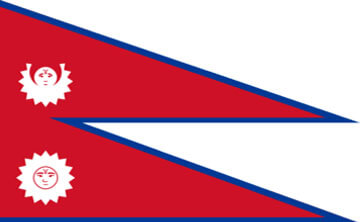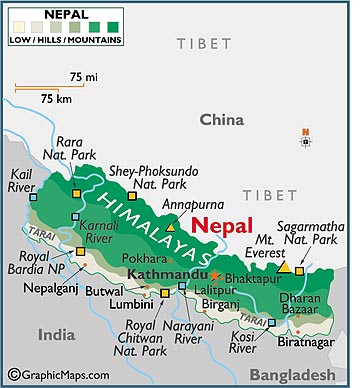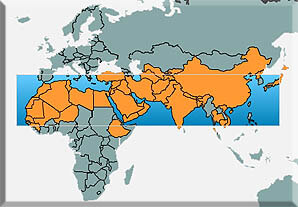No products in the cart.
Our Nations
Countries of Service
Alpha Ministries is currently ministering in several restricted countries across South Asia. Some of these include work in Bangladesh, Nepal, Myanmar, Sri Lanka, Thailand, and Cambodia. We are also work in Africa, with ministry in Ghana, Sierra Leone and Tanzania.
Whether supporting long-standing relationships or creating new ones, Alpha Ministries continues to be open to new and innovative ways to proclaim the good news of Jesus Christ to a lost and dying region of the world. The following highlights some of the countries in which we are serving.
Myanmar
Burma, officially the Union of Myanmar, is the largest country by geographical area in Indochina (mainland Southeast Asia). Burma has a population of about 56 million with Yangon, the capital being home to approximately 5 million.
The country’s culture, heavily influenced by neighbors, is based on Theravada Buddhism intertwined with local elements. Burma’s diverse population has played a major role in defining its politics, history and demographics in modern times, and the country continues to struggle to mend its ethnic tensions. The military has dominated government since General Ne Win led a coup in 1962 that toppled the civilian government of U Nu. Burma remains under the tight control of the military-led State Peace and Development Council.
Burma was administered as a province of British India until 1937 when it became a separate, self-governing colony. The country became independent from the United Kingdom on 4 January 1948, as the “Union of Burma”.
It became the “Socialist Republic of the Union of Burma” on 4 January 1974, before reverting to the “Union of Burma” on 23 September 1988. On 18 June 1989, the State Law and Order Restoration Council (SLORC) adopted the name “Union of Myanmar” for English transliteration. This controversial name change in English, while accepted in the UN and in many countries, is not recognized by opposition groups and by nations such as the United Kingdom and the United States.
89% of the population embraces Buddhism (mostly Theravada). Other religions are practiced largely without obstruction, with the notable exception of some ethnic minorities such as the Muslim Rohingya people, who have continued to have their citizenship status denied and therefore do not have access to education, and Christians in Chin State. Four percent of the population practices Christianity; 4 percent, Islam; 1 percent, traditional animistic beliefs; and 2 percent follow other religions.
Christian and Muslim populations face religious persecution and it is hard, if not impossible, for non-Buddhists to join the army or get government jobs, the main route to success in the country.

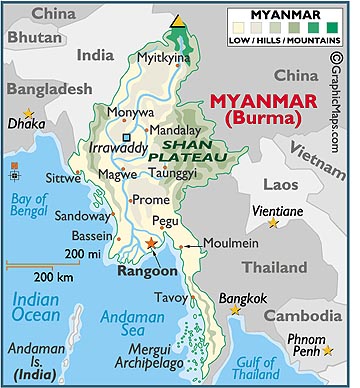
Thailand
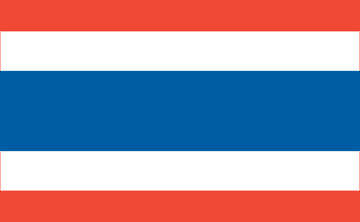
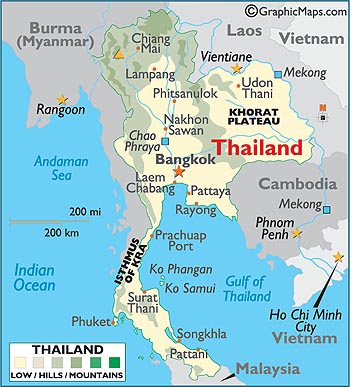
The country is a kingdom (formerly called Siam), a constitutional monarchy with King Bhumibol Adulyadej, the 9th king of the House of Chakri, reigning since 1946, making him the world’s longest-serving current head of state and the longest-reigning monarch in Thai history. The king is officially titled Head of State, the Head of the Armed Forces, an Upholder of the Buddhist religion, and the Defender of all Faiths.
The largest city is Bangkok, the capital, which is also the country’s center of political, commercial, industrial and cultural activities. Thailand experienced rapid economic growth between 1985 and 1995 and is a newly industrialized country with tourism and exports contributing significantly to the economy.
Thailand is the world’s 50th largest country in terms of total area (slightly smaller than Yemen and slightly larger than Spain), with a surface area of approximately 513,000 km2 (198,000 sq mi), and the 21st most-populous country, with approximately 64 million people. About 75% of the population is ethnically Thai, 14% is of Chinese origin, and 3% is ethnically Malay; the rest belong to minority groups including Mons, Khmers and various hill tribes. There are approximately 2.2 million legal and illegal migrants in Thailand. Thailand has also attracted a number of expatriates from developed countries. The country’s official language is Thai.
Thailand has a prevalence of Buddhism that ranks among the highest in the world. The national religion is Theravada Buddhism, practiced by more than 94.7% of all Thais. Muslims make up 4.6% of the population and 0.7% belong to other religions.
Nepal
Officially the Federal Democratic Republic of Nepal, this a landlocked country in South Asia and, as of 2010, the world’s most recent nation to become a republic. Current population is roughly 29 million with Kathmandu, the capital, being home to approximately 700,000.
Nepal is a country of highly diverse and rich geography, culture, and religions. The mountainous north has eight of the world’s ten highest mountains, including the highest, Sagarmatha, known in English as Mount Everest.
Hinduism is practiced by a larger majority of people in Nepal than in any other nation. Buddhism, though a minority faith in the country, is linked historically with Nepal as the birthplace of Siddhartha Gautama, who as the Gautama Buddha gave birth to the Buddhist tradition.
A monarchy throughout most of its history, Nepal was ruled by the Shah dynasty of kings from 1768, when Prithvi Narayan Shah unified its many small kingdoms. In 2006, however, a decade-long People’s Revolution by the Communist Party of Nepal (Maoist) along with several weeks of mass protests by all major political parties of Nepal culminated in a peace accord, and the ensuing elections for the constituent assembly voted overwhelmingly in favor of the abdication of the last Nepali monarch Gyanendra Shah and the establishment of a federal democratic republic in May 28, 2008.
